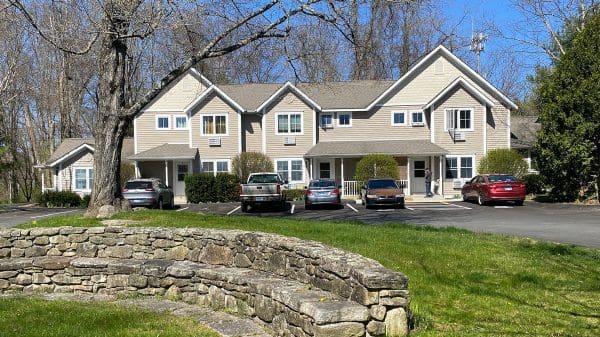KENT—It was apparent this week that both sides in the controversy over the Healthy and Balanced Living curriculum in Kent Center School want one thing—to protect students and to enrich their lives. They just differ about how to do that.

The issue surfaced at last week’s Board of Education meeting when parents stated their objections to the program, which includes discussions of gender identity and materials that some parents feel are best handled by family members.
The program, introduced two and a half years ago, is a state-recommended Region 1 curriculum offered in all six district towns. It is facilitated by Project Sage, previously known as Women’s Support Services.
“The curriculum was created in the best interest of all students, to promote all aspects of healthy relations,” said Region 1 Superintendent of School Lisa Carter. “It is meant to alert students to the pitfalls of social media and about boundary-setting.”
The sessions, which are offered once a week for eight weeks in grades six through eight, are taught by a school counselor and personnel provided by Project Sage. Carter said they are all either licensed social workers or teachers who have taught at the graduate level.
“It is based on standards within the curriculum supported by the State Board of Education,” Carter said. “There are aspects we are required to teach, but the Family Life curriculum, according to the state, is optional. Region 1 has made a commitment to it, and we think it is to the benefit of the students.”
She added that it appears the young people enjoy talking about such issues as respect and empathy. “We talk about how to get along together and thrive in a healthy, balanced way,” Carter said.
In a world where civil discourse is often hard to maintain, schools have focused for years on social-emotional learning, encouraging young people to identify their own emotions and providing them with tools to control them. With a new emphasis on gender identity, some programs discuss tolerance for the different ways people express their identities.
For some parents, this is unwelcome. “These are sensitive subjects,” said Bonnie Banffy, mother of two Kent Center School students. “It’s not a question of others’ lifestyles and decisions—of course, we should be respectful—but these are issues that shouldn’t be taught in school. I feel this is a parent’s responsibility.”
She considers some of the material too advanced for some children of that age. By eighth grade, the children discuss finding their identity and sexuality. Banffy said the course introduces vocabulary such as “anatomical sex, aromantic, asexual, biromantic, bisexual, cisgender, gay, gender binary” and more.
“These were taught along with a character called the “genderbread person,” which Banffy described as “too cartoonish” to convey serious information. It has recently been removed and replaced with a gender fluidity chart.
She is also upset by a lack of effective communication by the school. Parents are allowed to “opt-out” of the program, but she said she was neither informed about the class and nor provided with a form in a timely manner.
“I became familiar with the curriculum in November 2022 and started to express my concerns in December,” she said. “School officials were very unwilling to work with concerned parents at that time, but they said they would be more transparent with the lesson plans and would give opt-out forms.”
Indeed, school Principal Michell Mott said provisions were made to move the announcement of the course and the opportunity to opt-out from the bottom of the school’s newsletter to higher on the page. Each lesson is communicated through the newsletter, including the topic, what is included and the handouts.
“In a session with parents, it was suggested that Project Sage do an information meeting with parents, which we did this year. But there was mix up with the date of the session and the date the classes started,” the principal said.
To avoid this in the future, Mott said she developed a new timeline for the program, with classes starting in October 2025 “so we can inform parents and they have time to review everything.”
Banffy said she attended this fall’s meeting with no intention of making a hasty judgment. But she also discovered that Project Sage was being presented to sixth- and seventh-grade students and asked why she had not been informed. The administration said those classes would not be scheduled until spring. Banffy was dismayed after the winter recess when her son informed her he had been in a Project Sage class.
“I panicked and thought I had missed an email,” Banffy said. “But, no, I was told it was another oversight. Now, I am mad.”
Further frustration occurred when her “opted-out” children were given study halls. She wants enrichment programs provided for the children not taking part in Project Sage sessions.
“I filled out the form for my son and sent it in with a note that I wanted him to be afforded another educational opportunity,” Banffy said. “My children are A students; they do not need another study hall. They replied, citing state statutes, that they do not have to do this and we went back and forth. An eighth-grade teacher has opted to take them and is doing an educational opportunity. I’m so grateful,” Banffy said.
Banffy’s final concern is about the credentials of the Project Sage instructors. “We don’t know their educational or even their criminal backgrounds,” she said.
School administrators have reported that all instructors are either teachers or counselors.
Superintendent Carter said the Region 1 curriculum was developed by district counselors and the Project Sage staff. “We received parental feedback over a couple of years and have made tweaks and changes over time, mostly to improve the course.”
Banffy would like more changes. “People would like to see this as ‘opt-in’ rather than an ‘opt-out,’” she said. “I would like to see other enrichment opportunities for Healthy and Balanced Living. What is best for our community? Can we have some options here?”


























